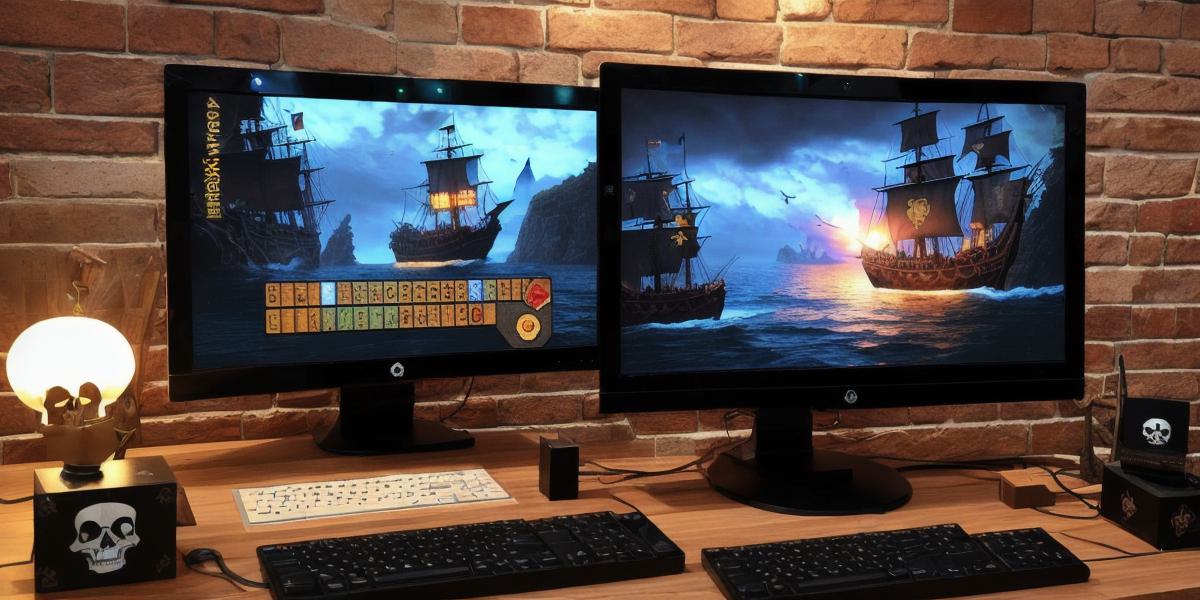Risks and Consequences of Using Pirate Software in Game Development: The Dark Side of Unlicensed Software

As game development becomes more accessible, it’s tempting for developers to use pirated software to save money and speed up development. However, this can come with significant risks and consequences that could harm your business in the long run. In this article, we will explore the dangers of using pirate software in game development, including legal implications, security risks, and potential reputational damage.
Introduction: The Dark Side of Unlicensed Software
Before we dive into the specific risks and consequences of using pirated software in game development, it’s important to understand what unlicensed software is and why it’s a problem. Unlicensed software, also known as pirate software or cracked software, is any software that has been modified or distributed without the proper licensing agreements.
Using pirated software can be tempting for developers who want to save money on expensive software licenses or who are under pressure to deliver a product quickly. However, the benefits of using unlicensed software are often outweighed by the risks and consequences, which can have serious implications for your business.
Legal Implications: The Risks of Using Pirated Software
One of the most significant risks of using pirated software is the legal implications. Software companies typically protect their intellectual property rights through copyright and patent laws. If you use unlicensed software that infringes on these rights, you could be subject to legal action.
In some cases, this could mean paying a hefty fine or even facing criminal charges for copyright infringement. In addition, using pirated software could also result in the loss of your company’s goodwill with the software vendor, which could make it more difficult to negotiate future licensing agreements or resolve any issues that may arise.
Security Risks: The Dangers of Using Pirated Software
Another significant risk of using pirated software is the security risks it poses to your business. Pirated software is often modified and distributed without proper testing, which can introduce vulnerabilities and security flaws into your code. This could make your game or application vulnerable to hacking or other security breaches, which could result in data loss or theft of sensitive information.
In addition, using pirated software could also expose your business to legal liabilities related to data breaches or cyber attacks. If your game or application is found to be responsible for a data breach, you could be held liable for damages and face reputational damage that could harm your business.
Reputational Damage: The Impact of Using Pirated Software on Your Business
Using pirated software can also have a significant impact on your business’s reputation. Consumers are becoming increasingly aware of the risks associated with using unlicensed software, and they may be less likely to trust your company if they know you are cutting corners by using pirate software. This could result in lost sales and damaged relationships with customers.
In addition, using pirated software can also damage your company’s relationship with other software vendors. If you are found to be using unlicensed software that competes with their products, they may be less likely to work with you in the future or provide support for your game or application. This could make it more difficult to develop and maintain your product, which could ultimately harm your business.
Case Studies: Real-Life Examples of the Risks and Consequences of Using Pirated Software
To help illustrate the risks and consequences of using pirated software in game development, let’s look at some real-life examples:
- The WannaCry Ransomware Attack
In 2017, a massive ransomware attack known as WannaCry affected millions of computers around the world, including those used by businesses and individuals. One of the ways that the ransomware was able to spread so quickly was because it exploited a vulnerability in Microsoft Windows that was introduced by an unlicensed version of the operating system. This highlights the security risks associated with using pirated software, even if it seems like a harmless way to save money on licensing fees.
- The Adobe Creative Cloud Hack
In 2018, a group of hackers managed to steal login credentials for over 70 million users of Adobe’s Creative Cloud, an online software platform used by millions of graphic designers and other creative professionals. One of the ways that the hackers were able to gain access to user accounts was because they found vulnerabilities in Adobe’s software that had been introduced by unlicensed versions of the program. This highlights the security risks associated with using pirated software, even if it is widely used in the industry.
- The Pirate Software Trial of Nintendo vs. Romanian Retailer
In 2019, a Romanian retailer was found guilty of selling pirated versions of Nintendo’s Switch game console and games. The retailer had modified the software to bypass the security measures that protect Nintendo’s intellectual property rights, and he was fined millions of euros for his actions. This highlights the legal risks associated with using pirated software, even if it is a common practice in some industries.
Conclusion: The Importance of Using Licensed Software in Game Development
In conclusion, using pirate software in game development can come with significant risks and consequences that could harm your business in the long run. From legal implications to security risks and reputational damage, there are many reasons why it’s important to use licensed software when developing games or applications.
If you are a developer who is considering using unlicensed software to save money or speed up development, we encourage you to think twice about your decision. By investing in legitimate software licenses and taking the time to properly test and secure your code, you can protect your business from potential legal liabilities, security breaches, and reputational damage.
FAQs: Frequently Asked Questions About Using Pirated Software in Game Development
- Is it legal to use pirated software in game development?
- No, using unlicensed software is generally illegal and can result in legal action, including fines and criminal charges.
- Can using pirated software introduce security vulnerabilities into my code?
- Yes, modifying or distributing software without proper testing can introduce vulnerabilities and security flaws into your code.
- How can using pirated software damage my company’s reputation?
- Using pirated software can make your company appear less trustworthy to consumers and other businesses, which could harm your business in the long run.
